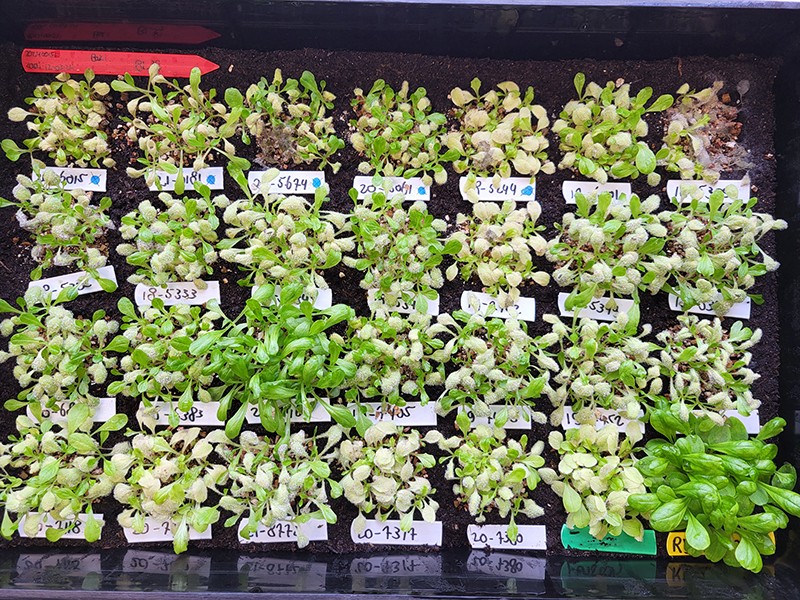
-
Variety Testing
-
Plant Breeders’ Rights and/or listing DUS-VCU
- Breeder's co-trials vegetable crops
- External Crop Experts Ornamental Crops
- Conditions of submitting identity material for DUS testing
- Calibration books Variety Testing
- National protocols Variety Testing
- Procedure of landraces, hobby market and conservation varieties
- American Plant Breeders' Rights - technical testing
- Two tests in one year
- Identity (Variety Tracer)
- Varietal trueness and varietal purity
- Resistance
-
Data of varieties
- Use of a third country synonym for a vegetable variety
- Vegetable-, agricultural- or ornamental crop?
- Authorisation: marketing material of not yet listed varieties
- Internal Naktuinbouw list for vegetable varieties
- List of names of Woody Plants and List of names of Perennials
- OrganicXseeds: database
- Variety descriptions
-
Plant Breeders’ Rights and/or listing DUS-VCU
- Inspections
- Testing & Analyses
- Knowledge & Education
- About us
-
Variety Testing
-
Plant Breeders’ Rights and/or listing DUS-VCU
- Breeder's co-trials vegetable crops
- External Crop Experts Ornamental Crops
- Conditions of submitting identity material for DUS testing
- Calibration books Variety Testing
- National protocols Variety Testing
- Procedure of landraces, hobby market and conservation varieties
- American Plant Breeders' Rights - technical testing
- Two tests in one year
- Identity (Variety Tracer)
- Varietal trueness and varietal purity
- Resistance
-
Data of varieties
- Use of a third country synonym for a vegetable variety
- Vegetable-, agricultural- or ornamental crop?
- Authorisation: marketing material of not yet listed varieties
- Internal Naktuinbouw list for vegetable varieties
- List of names of Woody Plants and List of names of Perennials
- OrganicXseeds: database
- Variety descriptions
-
Plant Breeders’ Rights and/or listing DUS-VCU
- Inspections
- Testing & Analyses
- Knowledge & Education
- About us
A new race of Bremia lactucae, Bl: 41EU, identified and denominated in Europe
Publicationdate: 4 juli 2024
Bremia lactucae, the causal agent of downy mildew in lettuce, is genetically very variable. Even within one lettuce production field, several races may be present. Monitoring the changes in the Bremia population is important for breeders and growers. The International Bremia Evaluation Board Europe (IBEB-EU) has collected more than 845 Bremia isolates from lettuce in 2023 and early 2024 (up to March) in Europe.

In 2023, the official races Bl: 38EU, Bl: 39EU and Bl: 40EU were often found, whereas the official races Bl: 35EU, Bl: 36EU and Bl: 37EU were found at a very low frequency. However, one virulence pattern, herewith referred to as race Bl:41EU, corresponding to the isolate REQ2301723, was found in 3% and 10% of the isolates in 2023 and 2024 (up to March), respectively. This virulence pattern of this isolate appeared for the first time in 2022.
Bl: 38EU 21% (2023), 4% 2024 (up to March)
Bl: 39EU 4% (2023), 1% 2024 (up to March)
Bl: 40EU 18% (2023), 26% 2024 (up to March)
Bl: 41EU (REQ2301723) 3% (2023), 10% 2024 (up to March)
A formal evaluation process started in December 2023. In April 2024, the IBEB-EU concluded that the candidate isolate provided consistent test results.
REQ2301723, from France, is denominated as the type isolate of new race Bl: 41EU with IBEB-D sextet code 62-31-07. Bl: 41EU was found repeatedly in France, Germany, Switzerland, the Netherlands and the United Kingdom. Bl: 41EU breaks many resistance genes including R53, R55, and R56.
The board emphasizes the importance of chemical control and hygiene measures in addition to plant resistance. Fungicide application, especially in a young plant stage, gives additional protection to resistant lettuce crops, which will help prevent the development of new Bremia races. Proper hygiene practices, such as removal of debris and diseased plants, cleaning of farm equipment and prevention of prolonged periods of leaf wetness, will reduce the spread of Bremia in lettuce crops.
More information?
Please contact Naktuinbouw Variety Testing department, Diederik Smilde or Wim Sangster: telephone +31 (0)71 332 62 62 or email.
Source: International Bremia Evaluation Board Europe (IBEB-EU)
Naktuinbouw only uses functional and analytical cookies. More information